Obama's legacy: Are black voters still fired up?
- Published
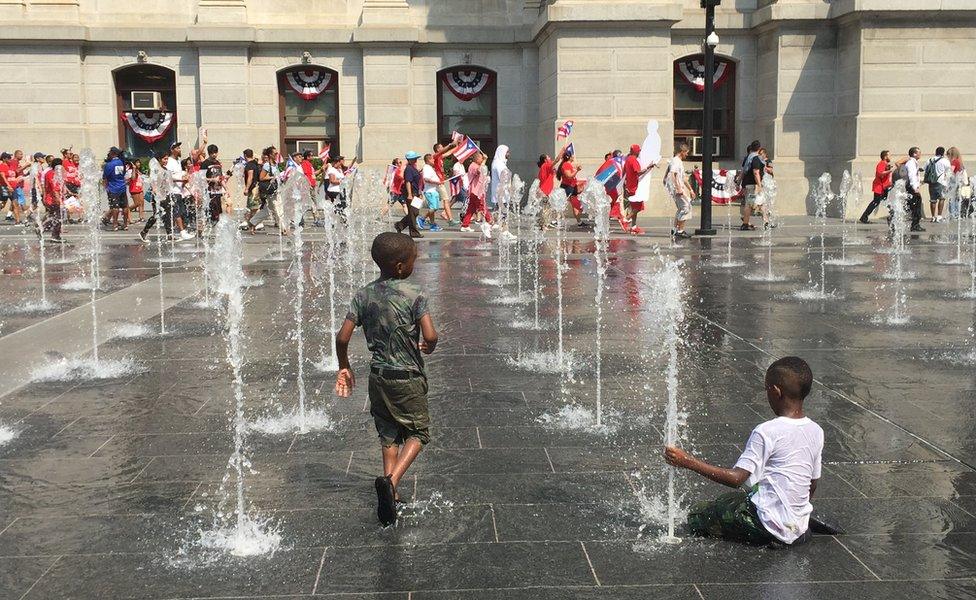
Two boys play in a fountain in front of Philadelphia's City Hall as demonstrators march in protest of the DNC
The predominantly African-American neighbourhood of Cobbs Creek is miles away from the glittering stage where President Barack Obama will address the Democratic National Convention tonight. As he prepares to leave office, the residents ponder the legacy of the first black president.
On the morning of the second day of the DNC, Philadelphia Police Department Captain Robin Wimberly is far away from the delegates and the speechmaking. She's on the other side of town, visiting a summer camp class in a brightly painted storefront on South 60th Street in the Cobbs Creek neighbourhood.
"Are you, like, connected to the president and stuff?" a boy in the back row of the classroom asks.
"Um, so…the police are a part of local government," Wimberly begins, struggling to make the connection for the students. "I'm the bottom of the food chain but - somehow I'm connected."
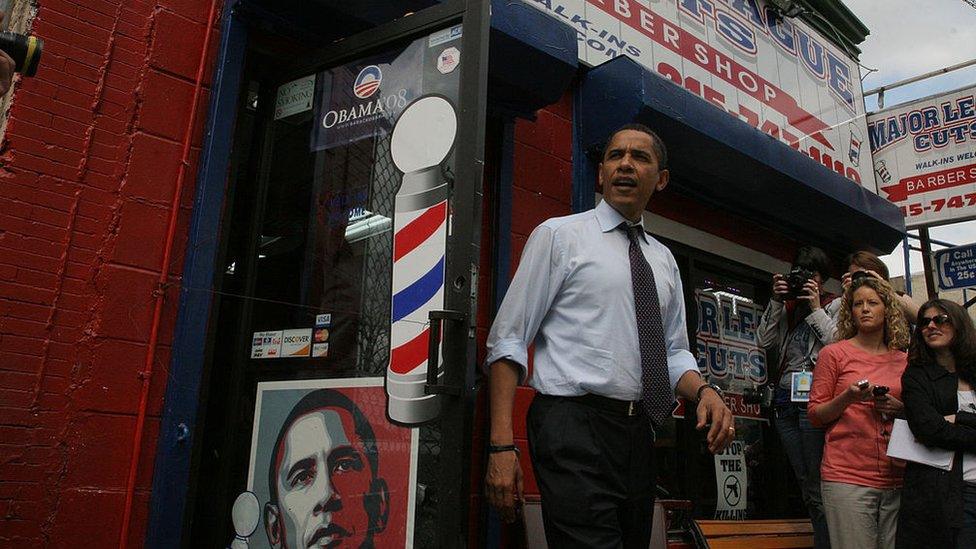
Obama campaigned in West Philadelphia in 2008
It is hard to link what happens here in Cobbs Creek directly to the decisions that Barack Obama made in the White House for the last eight years.
In 2008, Obama inspired record numbers of black voters to come to the polls for the historic election - African Americans age 18 to 44, external outnumbered any other ethnic group. In both his first and second elections, entire wards in west Philadelphia went 100% for Obama, external. Some optimists thought that an Obama presidency would mean substantive change and new opportunities in communities of colour.
But the reality is that many black voters are still living in the exact same circumstances they were eight years ago. Despite that, as the Obama administration comes to a close, the residents from Cobb Creek who voted him into office take a nuanced approach to his legacy.
"I tell you what Obama did for me - he gave me hope. I saw a struggling black man in power trying to put programmes together, approving legislation they turned down, but he continued to strive," says Doris Hall-James, the owner of Simply Music Studio on 60th Street, the main business corridor in Cobbs Creek.
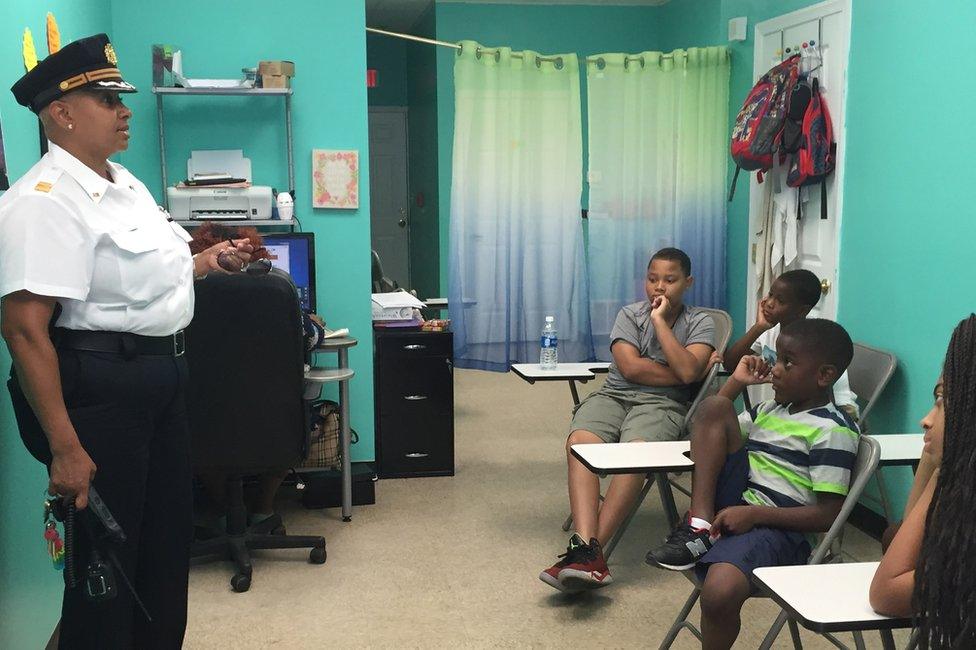
Captain Wimberly tries to explain the connection between local police and President Barack Obama
"If he could brush this stuff off and go back again, try again - we can do the same thing."
That perspective is repeated again and again in the neighbourhood - that Obama was the most disrespected president, the most stymied by Congress, and that the lack of change in the country has not been for his lack of trying.
"For me to witness a person of colour leading the entire country - I don't know if that's ever going to happen again," says Ashley Carrington, the owner of Ashley's Academic Services down the block.
"The disrespect, the criticism he received, and how he still managed to be positive - I really respect him for that."
The election of the first black president stirred high hopes in places like Philadelphia, which has the highest rate of deep poverty, external of the largest 10 US cities. In Cobbs Creek, the poverty rate is at 30% and unemployment is 18.5%, external - far higher than the city's rate overall, roughly 7%.
Philadelphia's public schools, external are also famously underfunded and over the years, thousands of teacher jobs have been cut and spending per pupil has dropped.
Businesses like the Simply Music Studio have sprung up to try to supplement some of the loss of arts education. However, owner Hall-James says that while she sees kids pushing their noses against the glass, looking at all the guitars and keyboards inside, they rarely venture inside because their parents can't afford her $25 (£19) classes.
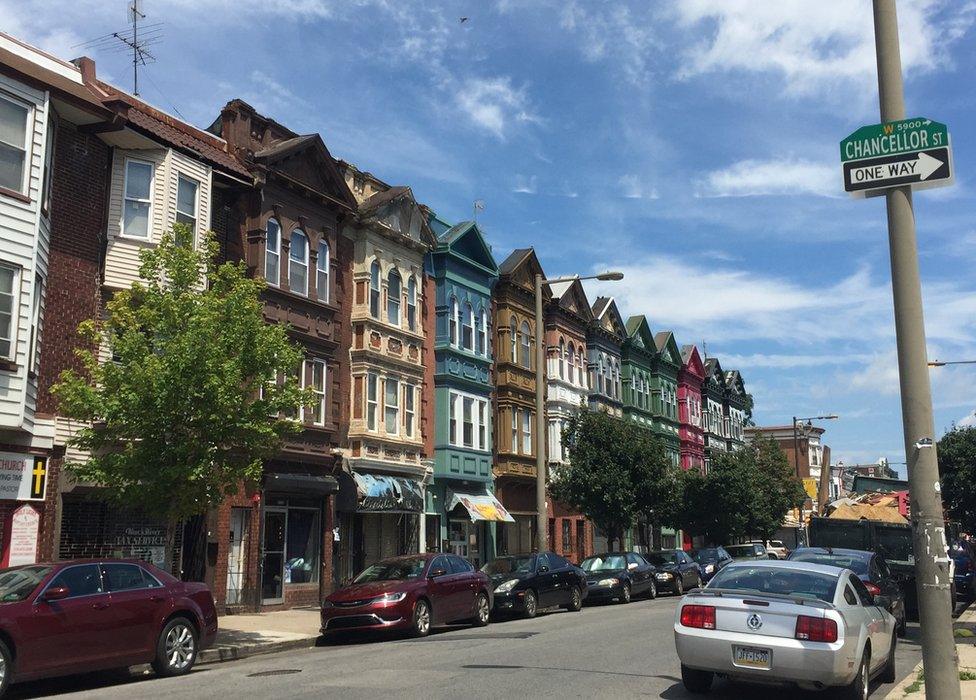
60th Street was once a thriving business corridor populated by black-owned businesses
"We've been here a year and a half, but we can't seem to get the clientele who we're here to serve," she says. "It's because of finances."
A perceived lack of change does not mean that the West Philadelphian community will not be ready to vote in November, at least not according to Imam Amin Aziz, who says he is already organising within the black Muslim community.
He says that some of the remarks that Donald Trump has made have led to acts of vandalism, external at local mosques.
"We're a small percentage of the population, but we're going to pack the polls and we're packing the polls behind Hillary Clinton," he says.
"She's not the best candidate but she's better than Trump. This will continue some of President Obama's legacy in reference to the poor."
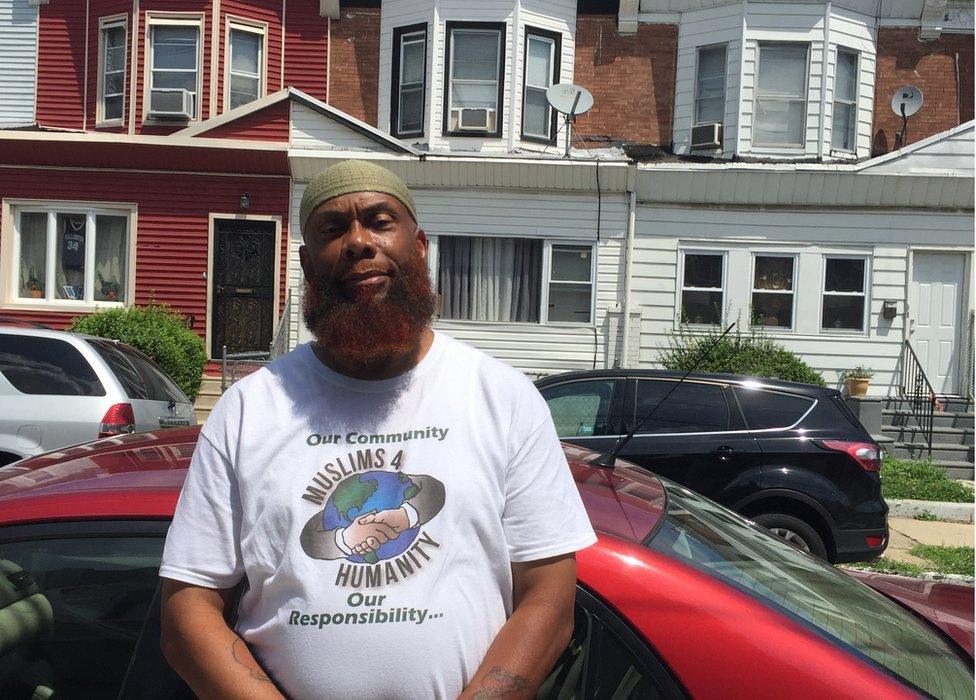
Kayzar Abdul Khabir, one of the founders of Muslims 4 Humanity, says that changes is coming to Cobbs Creek through groups like his
Kayzar Abdul Khabir, one of the founders of Muslims 4 Humanity, is part of that get-out-the-vote effort and operates out of a masjid on 60th Street. He is frustrated that so much media attention has focused solely on the rivalry between Trump and Clinton.
"There are 88 seats up between the senate and congress - those are the people you better start looking at," he says.
As he walks up and down the block, he points to signs in the windows of businesses that read "We Support Muslims 4 Humanity". This, for Khabir, is a signal of tangible change in Cobbs Creek. The local Muslim community didn't always patrol the neighbourhood, partner with the local police, or act as peacemakers in the skirmishes that break out between rival gangs in the area.
"As Muslims, we really didn't get out that much, we stayed behind our doors," he says. "Our imam, he inspired us by telling us that we can't just do it inside of our doors …the community has been very responsive to the fact that we're out."
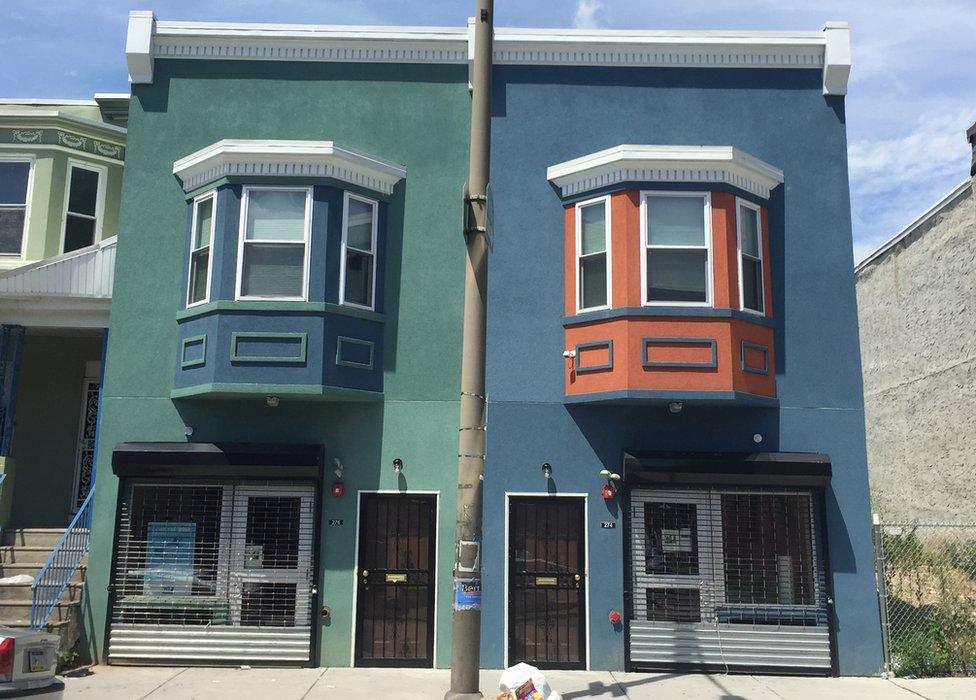
The former home of Bernie Sanders' campaign offices on 60th Street in Cobbs Creek
Inside a cheerful, but empty nail salon near Khabir's masjid, owner Mary Tucker is one of the few residents who's willing to voice some support for Trump. She's intrigued by his business experience and completely turned off by the Obamas, who criticised Clinton so harshly in the 2008 campaign but are now calling her the best candidate.
At the same time, Tucker is blunt about what she thinks makes change in a struggling neighbourhood like Cobbs Creek.
"All these poor neighbourhoods - there is no messiah. It doesn't matter who's president, I'm still going to have the same issues," she says. "I'm still going to have an empty shop." Gun violence, she says, will still be plentiful in the neighbourhood.
"That's my only issue - I want to build my community up from within. Everything else don't matter."

More from the BBC
